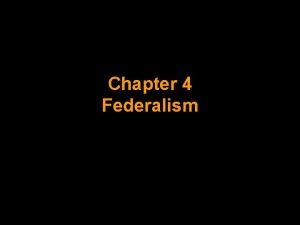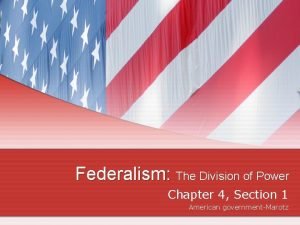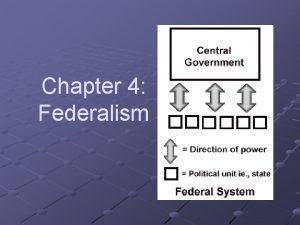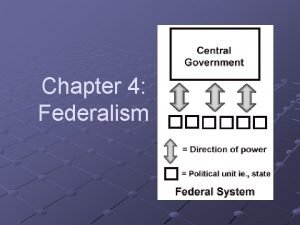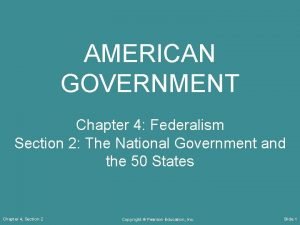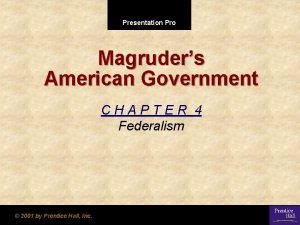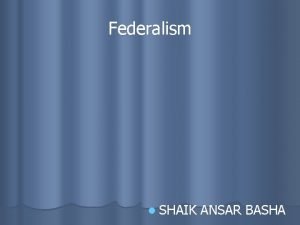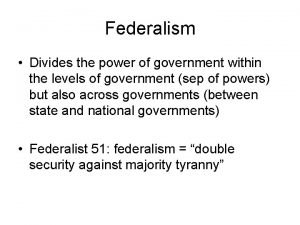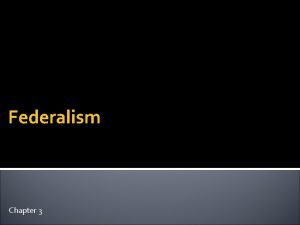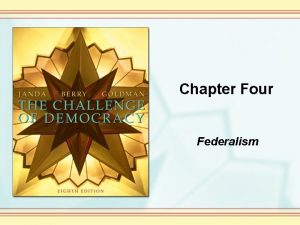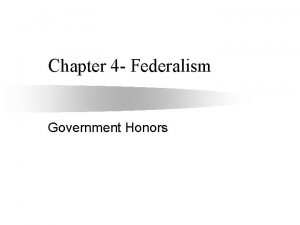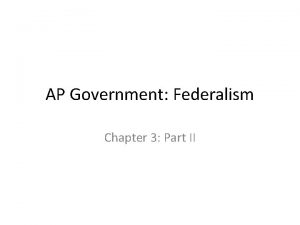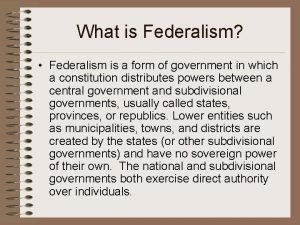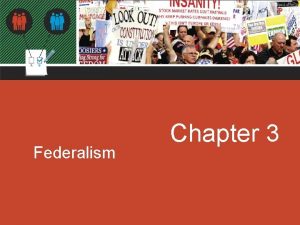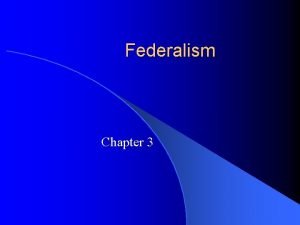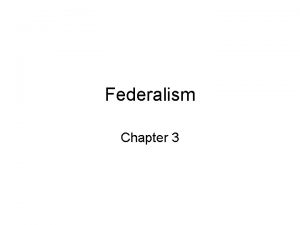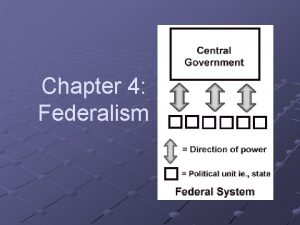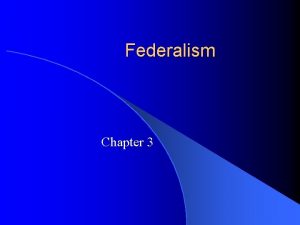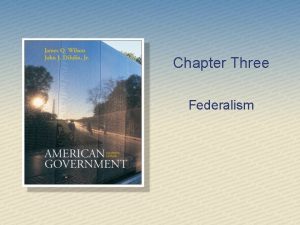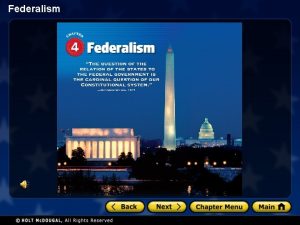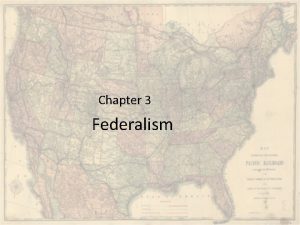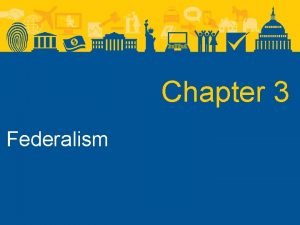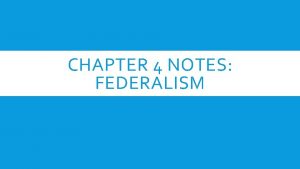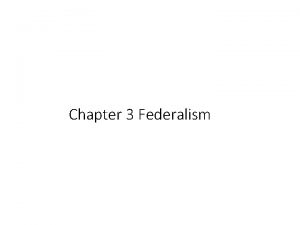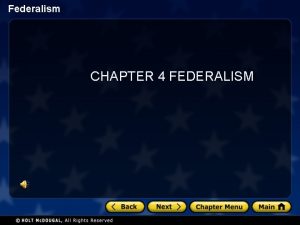Chapter 4 Federalism What is Federalism Federalism is




















- Slides: 20

Chapter 4: Federalism

What is Federalism? Federalism is the way we divide power between the central national government, and the regional state governments

Why do we use a Federalist System? Framers believed government was a threat to individual liberty Government must therefore be restrained Dividing the powers Limits Government

Differences Between States In Oregon and New Jersey, it is illegal to pump your own gas In Nevada, it is illegal to ride a camel on state highways In Texas, criminals are required to inform their victims of the crime to be committed 24 hours in advance, either verbally or in writing

Differences Between States In Massachusetts, it is illegal to go to bed without taking a full bath In Ohio, it is illegal to get fish drunk In California, it is illegal for a car without a driver to exceed 60 miles per hour

Powers of the National Government Delegated Powers - The national government has only the powers that are delegated to it by the Constitution Three types of delegated powers: n n n Expressed Powers Implied Powers Inherent Powers

Expressed Powers that are spelled out in the Constitution very specifically (expressly) Also known as “enumerated powers” Most are found in Art. I, Sect. 8

Expressed Powers (cont’d) Examples: coin money, raise and maintain armed forces, declare war, fix standards of weights and measures…

Implied Powers of the national government which are not expressly stated in the Constitution, but which are reasonably suggested (implied) by the expressed powers Elastic Clause/Necessary and Proper Clause! n Article I, Section 8, Clause 18

Implied Powers (cont’d) Examples: n n Building of dams Building of the Interstate highway system Criminalizing racial discrimination Necessary and Proper has been interpreted to mean “convenient and useful, ” so anything that the national government sees as convenient and useful might be made into federal law.

Inherent Powers not expressly stated by the Constitution, but which belong to the United States government because it is a sovereign state in the world community

Inherent Powers (cont’d) Examples: Regulate immigration n Acquire territory n Protect nation against rebellion or other attempts to overthrow the nation by force or violence n (There aren’t a lot of these. ) n

Denied Powers (of the National Government) Levy duties (tax) exports Take private property for public use without just compensation (Eminent Domain) To deny rights that are found in the Bill of Rights, such as freedom of speech, religion, press and assembly Article I, Sect. 9=Denied Powers of Congress

Denied Powers (not expressed) Limited Government: The government only has those powers which the people, through the Constitution, have given it, so anything else is denied. The power to make a national public school system The power to enact marriage and divorce laws for the whole country The power to set up local government

Powers of the States Reserved Powers: Those powers which the Constitution does not delegate (grant) to the National Government, but does not, at the same time, deny to the states Amendment 10!

Reserved Powers “The Powers not delegated to the United States by the Constitution, nor prohibited by it to the States, are reserved to the States respectively, or to the people. ” - 10 th Amendment

Examples of Reserved Powers Drivers’ licenses Marriage licenses School system Enacting land use laws Regulating drinking age Outlawing gambling n (There are tons of things the states have powers to do. )

Denied Powers (of State governments) Expressly denied: No entering into alliances, treaties, or a confederation No printing or coining of money No depriving people of their rights (Anything denied in the U. S. or their state’s constitution) Inherently denied: No taxing of the federal government

Exclusive vs. Concurrent Powers Exclusive Powers – Those which are delegated to the National Government alone. States cannot exercise these powers. Concurrent Powers – Those which both the states and the national government can exercise

Concurrent Powers Examples: Levy and collect taxes n Borrow money n Establish courts n Define crimes and set punishments n Claim private property for public use (when there is just compensation) n
 Federalism powers divided worksheet
Federalism powers divided worksheet Federalism the division of power chapter 4 section 1
Federalism the division of power chapter 4 section 1 Chapter 4 federalism the division of power
Chapter 4 federalism the division of power Chapter 4 federalism
Chapter 4 federalism Chapter 4 federalism
Chapter 4 federalism American government chapter 4
American government chapter 4 Chapter 4 federalism
Chapter 4 federalism Features of federalism
Features of federalism Nationalist position definition
Nationalist position definition Federalism
Federalism Difference between regionalism and federalism in a sentence
Difference between regionalism and federalism in a sentence Federalism
Federalism Federalists definition
Federalists definition Types of federalism
Types of federalism The basic premise of federalism is that
The basic premise of federalism is that Full faith and credit clause examples
Full faith and credit clause examples Federalism
Federalism Fiscal federalism definition ap gov
Fiscal federalism definition ap gov Advantages of federalism
Advantages of federalism Dual federalism
Dual federalism Federalism in the constitution
Federalism in the constitution

